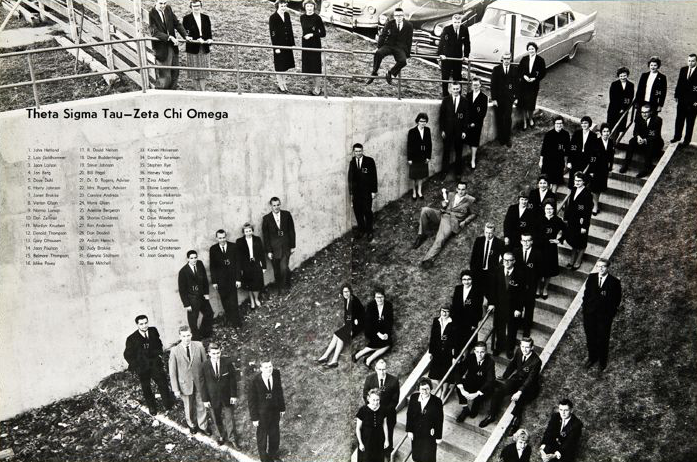Patrick Hicks nominated for South Dakota Poet Laureate, host of SDPB’s “Poetry From Studio 47”
On a cloudy Saturday in January, Augustana English professor Patrick Hicks sat waiting to be interviewed in Chamberlain, South Dakota. The interview would determine if he would join elite writers who have made their mark in state history.
Hicks is one of three finalists nominated to become the next South Dakota Poet Laureate along with South Dakota State University’s Christine Stewart-Nuñez and Mount Marty College’s Jim Reese.
After the interviews, the South Dakota Poetry Society passed its recommendation for the post to Governor Kristi Noem, who will announce the laureate in either May or June as the term for current laureate—Lee Ann Roripaugh, appointed in 2015—ends.
If selected, Hicks would become the state’s seventh poet laureate, a position that was first created in 1937, though the four-year term limit was not instituted until 2015. The South Dakota Poet Laureate is not only considered the state’s chief poet, he or she is also called upon to be an ambassador and advocate for initiatives to increase literary education and poetry awareness.
In his application, Hicks had to outline possible initiatives that he would promote during his tenure as poet laureate.
The first is to continue his radio show on South Dakota Public Broadcasting, “Poetry From Studio 47,” which airs every Friday and is produced by Augustana’s own orchestra conductor, Peter Folliard. The show looks at “the power and presence of poetry in South Dakota and beyond,” according to the SDPB website.
“I’m having a blast doing that, even though it is an incredible amount of work,” Hicks said. “If I’m really lucky, and if I’m doing my job properly, maybe I will read a poem on the air that really deeply impacts someone and they think to themselves, ‘I didn’t know that’s what poetry could do, I didn’t know that’s what poetry was.’ I only need one person a week to do that to and that justifies the whole enterprise.”
Hicks also wants to use poetry as a tool for restoration and healing.
“The other initiative that I would want to start is working with veterans who might have PTSD and helping them with creative writing workshops to help them, sort of, write about their experiences,” Hicks said.
Finally, Hicks shared his desire to teach poetry workshops with South Dakotans, especially those that are still learning.
“I wanted to get into high schools and run some workshops so that students at the high school age might come to understand what poetry is,” Hicks said. “I frequently feel that American society feels like they know what poetry is, but they don’t.”
Patrick, the Professor
In 2002, Patrick Hicks took over the position of professor and Writer-in-Residence at Augustana.
“I just love writing so much that it seemed like a good idea to get a job where someone paid me to talk about it,” Hicks said. “I just so enjoy stepping into a classroom and talking about how we can become better writers and thinkers for 80 minutes. It’s a wonderful, wonderful way to spend a day.”
Hicks hopes to teach his students how poetry can help explore the human condition and communicate across generations.
“Whether they’re writing prose or poetry, the thing I want them to keep in the forefront of their mind and imagination is that they need to be honest with themselves,” Hicks said. “That they need to write from the gut, and not necessarily from the head. They need to be putting down things on the page that might scare them and if they feel like, ‘I’m not sure I should be writing about this,’ that’s exactly what they need to be writing about.”
Junior Chloe VanGerpen found this struggle with honesty to be one of the main lessons of Hicks’ teaching.
“My biggest takeaway from Patrick’s [advanced composition] class was that our best papers are often the hardest to write,” VanGerpen said. “If you’re willing to try, you’ll become a better writer and person.”
But Hicks’ role in the department isn’t all business. Fellow English professor Daniel Gerling commends Hicks for his welcoming nature and his ability to laugh even on the most stressful day.
According to Gerling, Hicks also stands out in the English department for another important trait.
“It’s tough to beat out [journalism Professor Jeffrey] Miller in this regard, but Patrick definitely has the best hair,” Gerling said.
Although his luscious locks are to be admired, Gerling also appreciates Hicks’s talent for connecting with others and his strong work ethic.
“He has a gift for being able to connect to the general public via television, radio or newspaper interviews and channel both significant moments in history and the importance of literature in our lives,” Gerling said. “When I first met him he was chair of the department, teaching a full load of classes, married with a young son and he was also able to publish three books in the span of about a year. That kind of thing doesn’t happen magically. It takes persistence and talent and most of all, probably, sweat.”
VanGerpen also admires Hicks’s “down to earth” mentality, especially when considering his prowess as a writer.
“I never felt like he was looking down at me or acting like he was a better writer than me, even though he totally is,” VanGerpen said. “Patrick is a great professor and a tough grader. You’ll probably resent his grading at some point during the semester, but at the end, you’ll thank him for it.”
Hicks has been able to connect with students year after year. The evidence shows in the numerous thank you notes from past students that hang from the overcrowded bookshelf in his office.
Patrick, The Writer
From a young age, Patrick Hicks always knew he wanted to be a writer.
“I was one of those annoying kids that when I was really young—six, seven years old—I started writing poems and short stories,” Hicks said. “Of course, in high school, I wrote poems because I thought it would make me attractive to women. But, behind that, it was a real deep need to understand the craft and the art. Then, by the time I was in college, I was very serious about my writing, but even then, I didn’t really tell my friends too much that I was writing because I was worried that it wouldn’t be cool. But I’ve always been a writer.”
Hicks, the son of an Irish immigrant, has authored over ten books, some of which have been published internationally. According to the biography on his website, he has been nominated for numerous prestigious awards, has been the recipient of several grants and was even a finalist for an Emmy.
Hicks’ most recent book, The Commandant of Lubizec, a novel set during the Holocaust has received critical acclaim and reviews from accomplished writers such as Pulitzer Prize-winning Robert Olen Bulter.
Gerling notes that Hicks’s novel was the last book that made him “weep.”
“I’m on a plane returning from a conference in Puerto Rico, sitting between two strangers, and I’m bawling while finishing the book,” Gerling said.
Hicks also had one of his poems, “The Strangers,” from his collection Adoptable, featured on NPR and PBS.
The poem focuses on the night he and his wife picked up their son, who they adopted from South Korea, from the airport. He writes about the struggle that they had as new parents helping their son adjust to a whole new life. The poem ends with the line, “In time, even terror must yield to sleep.”
It is this kind of vulnerability that characterizes so much of Hicks’s work.
“I see poetry, when it’s done well, as an incredible act of bravery because you’re being honest with yourself and being honest with the reader,” Hicks said. “To be a writer is to have a lot of courage because you have to tell the truth, and sometimes people don’t want to hear that.”
Gerling knows that in order to truly understand Hicks, you have to understand his writing and the different parts of the human condition that Hicks chooses to write about. Gerling said that reading Hicks’s work should be a requirement, both for students and faculty.
“If you want to know who I am, you just have to read my work, because each page has a slice of me on it,” Hicks said.



